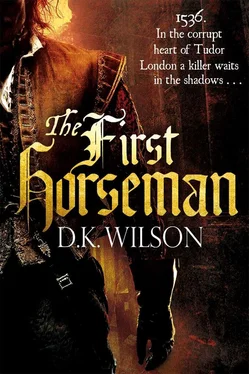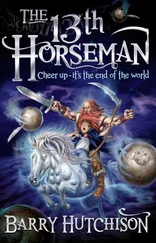D. Wilson - The First Horseman
Здесь есть возможность читать онлайн «D. Wilson - The First Horseman» весь текст электронной книги совершенно бесплатно (целиком полную версию без сокращений). В некоторых случаях можно слушать аудио, скачать через торрент в формате fb2 и присутствует краткое содержание. Год выпуска: 2013, ISBN: 2013, Издательство: Little, Brown Book Group, Жанр: Исторический детектив, на английском языке. Описание произведения, (предисловие) а так же отзывы посетителей доступны на портале библиотеки ЛибКат.
- Название:The First Horseman
- Автор:
- Издательство:Little, Brown Book Group
- Жанр:
- Год:2013
- ISBN:9781405518871
- Рейтинг книги:5 / 5. Голосов: 1
-
Избранное:Добавить в избранное
- Отзывы:
-
Ваша оценка:
- 100
- 1
- 2
- 3
- 4
- 5
The First Horseman: краткое содержание, описание и аннотация
Предлагаем к чтению аннотацию, описание, краткое содержание или предисловие (зависит от того, что написал сам автор книги «The First Horseman»). Если вы не нашли необходимую информацию о книге — напишите в комментариях, мы постараемся отыскать её.
The First Horseman — читать онлайн бесплатно полную книгу (весь текст) целиком
Ниже представлен текст книги, разбитый по страницам. Система сохранения места последней прочитанной страницы, позволяет с удобством читать онлайн бесплатно книгу «The First Horseman», без необходимости каждый раз заново искать на чём Вы остановились. Поставьте закладку, и сможете в любой момент перейти на страницу, на которой закончили чтение.
Интервал:
Закладка:
We were charged with decorating with cloth of gold the house fronts opposite St Michael’s at Querne at the end of Cheap, close by the gate to Paul’s Yard. However, it was not our gaudy preparations for the royal show that dominated our conversation as we supervised the servants clambering up ladders to attach our loyal tributes.
‘Have you heard? He’s been called to Westminster to be knighted by the king. Scandalous!’
As usual, it was Simon Leyland who was complaining. The ‘he’ referred to was Ralph Warren, alderman, sometime Master of the Mercers’ Company and reputed the richest man in London. His nomination as the new Lord Mayor had been announced some weeks before and had divided the merchant community into warring factions. The Common Council had determined upon Sir Ralph Holles as the next holder of the leading civic office but had been overborne by the king, who had sent his mandate instructing the council to elect Warren.
‘He has lent the king large sums of money,’ my friend Will Fitzralph commented.
‘That’s not to the point,’ Leyland retorted. ‘The king likes not Holles for certain foolish words spoken in support of the northern rebels.’
‘Are you, then, a secret sympathiser with these papist pilgrims?’ I asked with a wink at Will. We both knew where Leyland’s religious sympathies lay.
‘Certainly not,’ he roared. ‘Holles is a troublesome heresy-hunter and I like not the man but there is a more important principle at stake. Our ancestors fought hard to establish our civic liberties and we should not allow the king to trample them.’
‘I fear present politics count for more than ancient rights with our Harry,’ Will said, being careful to lower his voice so that the servants could not hear. ‘At the moment he is all for the new men.’
I was surprised to hear our new Lord Mayor named in that context. ‘I had not heard that Warren is a religious radical.’
‘Well,’ said Will, ‘he’s very close with Cromwell and he has just been appointed the king’s representative to the German merchant community here at the London Steelyard — and we all know what a nest of Lutherans that is. No, no, Peter, more to the left!’ This last comment was addressed to one of the servants balanced on a ladder above our heads.
‘I got up a petition to the Common Council while you were away from London — again .’ Leyland glared at me and emphasised the word. ‘I asked them to appeal against the king’s order.’
‘Which they did,’ Will added. ‘But Cromwell produced an old statute that, it seems, gives the monarch the right to interfere in all our elections.’
When the great day arrived, I breakfasted early and allowed all my household to gather in my chamber where they would have a good view of the street, while I donned my livery robe and went to take my place with my brother goldsmiths on the platform erected for us over against St Michael’s Church. Even at that early hour the crowds had begun to gather, pressing against the cordon of troops who lined the route.
It was soon after ten o’clock that we heard the cheers from the direction of Fleet Street. Within minutes the procession emerged from the cathedral yard. First came the aldermen in their best liveries, then various officials of the court wearing rich furs against the cold and sporting jewelled bonnets. Then the escort of Gentlemen Pensioners marched past and we craned our necks to see the king and queen. It was then that I heard gasps from my neighbours. Leaning forward and turning to the right, I straightway saw what was surprising them. Immediately preceding the royal couple, in the position of honour, riding a richly caparisoned stallion, and carrying an ornate gilded mace, was Ralph (now ‘Sir Ralph’) Warren. ‘God’s blood,’ my neighbour muttered, ‘the king means to rub our noses in it!’
Whatever indignation may have been caused among the mercantile elite, there was no doubting that the royal show was a success. King Harry’s flawless instinct for simple ways of pleasing the people once again served him well. Fear of the Pilgrimage of Grace had stirred ancient prejudices about ‘uncouth’ northerners and, whatever religious divisions might exist among London’s citizens, there was unity when it came to their dislike of rebellion and their concern for the security of their property. Relief gilded their curiosity about Henry’s young queen, small and demure as she trotted past in the wake of her corpulent husband. Both royal horses were caparisoned in yellow, symbolising, I suppose, sun-like brilliance and warmth triumphing over winter darkness and rebellion. The entourage made its way past ranks of robed company men, mitred bishops and abbots, and priests swinging censers, and was cheered all the way to the bridge. It was on such occasions as this, when the City’s mercantile nobility were on display in their full livery, that I realised what a gap Robert Packington had left in the ceremonial and business life of London.
When Twelvetide arrived, I led the celebrations of my household on the first day. After mass in the morning we feasted and played various games over which the youngest scullion presided as our Lord of Misrule. The following days I gave permission for those who wished to depart and celebrate with families and friends to do so. I, of course, had much more serious matters on my mind, when, at dawn on 26 December, I had Golding saddled (I wanted to ease Dickon back into service) and set off for Greenwich and my meeting with Lord Cromwell.
Chapter 34
It was easy to see why the king favoured Greenwich Palace above his other residences close to the capital and spent most of his winters there. As I emerged from the deer park and began the gentle sweep down to the sprawl of red-brick buildings set amidst walled gardens, I was impressed by its sheer size and its location. On such a crisp, clear winter’s day the palace could be seen to its best advantage, its towers and turrets outlined against the green-blue of the Thames. Looking down from a southerly approach was almost like seeing a map of this old royal home. I could make out the Italian-style gardens, where plants and grass were disciplined, in obedience to the latest fashion, into geometrical shapes intersected with gravelled walks. The tiltyard, Henry’s own addition to the ensemble, was clearly visible. I could just see the craft moored beyond on the palace waterfront and upriver the tall masts of larger ships in Deptford dockyard. Placentia, or Pleasaunce, as it was sometimes called, seemed to have everything a cultured and fun-loving prince could want. I could only hope that this visit would ‘pleasure’ me; that Cromwell would receive my report and deal with Incent and his confederates. The prospect of seeing that red-haired head grimacing from the top of a pole at the end of London Bridge was one that I relished.
I left my two servants with the horses in the stable block and showed Cromwell’s letter to one of the guards, who arranged for me to be escorted into the depths of the palace. We passed across courtyards, up staircases and through several rooms until we arrived in a large and busy antechamber. I presented my credentials to a secretary sitting at a table and took my place among a score of petitioners and messengers standing in small groups and all waiting to be shown into the great man’s presence. I wandered across to a window embrasure commanding an excellent view of the river. I was peering idly at the marshland spur opposite held in, as it were, by the steep bend of the Thames when someone came up behind and quietly spoke my name. I turned and recognised the sombre face of Augustine Packington.
‘Thomas, what brings you here?’ he asked anxiously.
I explained briefly the commission that had taken me to Antwerp and that I had now come to deliver my report.
Читать дальшеИнтервал:
Закладка:
Похожие книги на «The First Horseman»
Представляем Вашему вниманию похожие книги на «The First Horseman» списком для выбора. Мы отобрали схожую по названию и смыслу литературу в надежде предоставить читателям больше вариантов отыскать новые, интересные, ещё непрочитанные произведения.
Обсуждение, отзывы о книге «The First Horseman» и просто собственные мнения читателей. Оставьте ваши комментарии, напишите, что Вы думаете о произведении, его смысле или главных героях. Укажите что конкретно понравилось, а что нет, и почему Вы так считаете.












